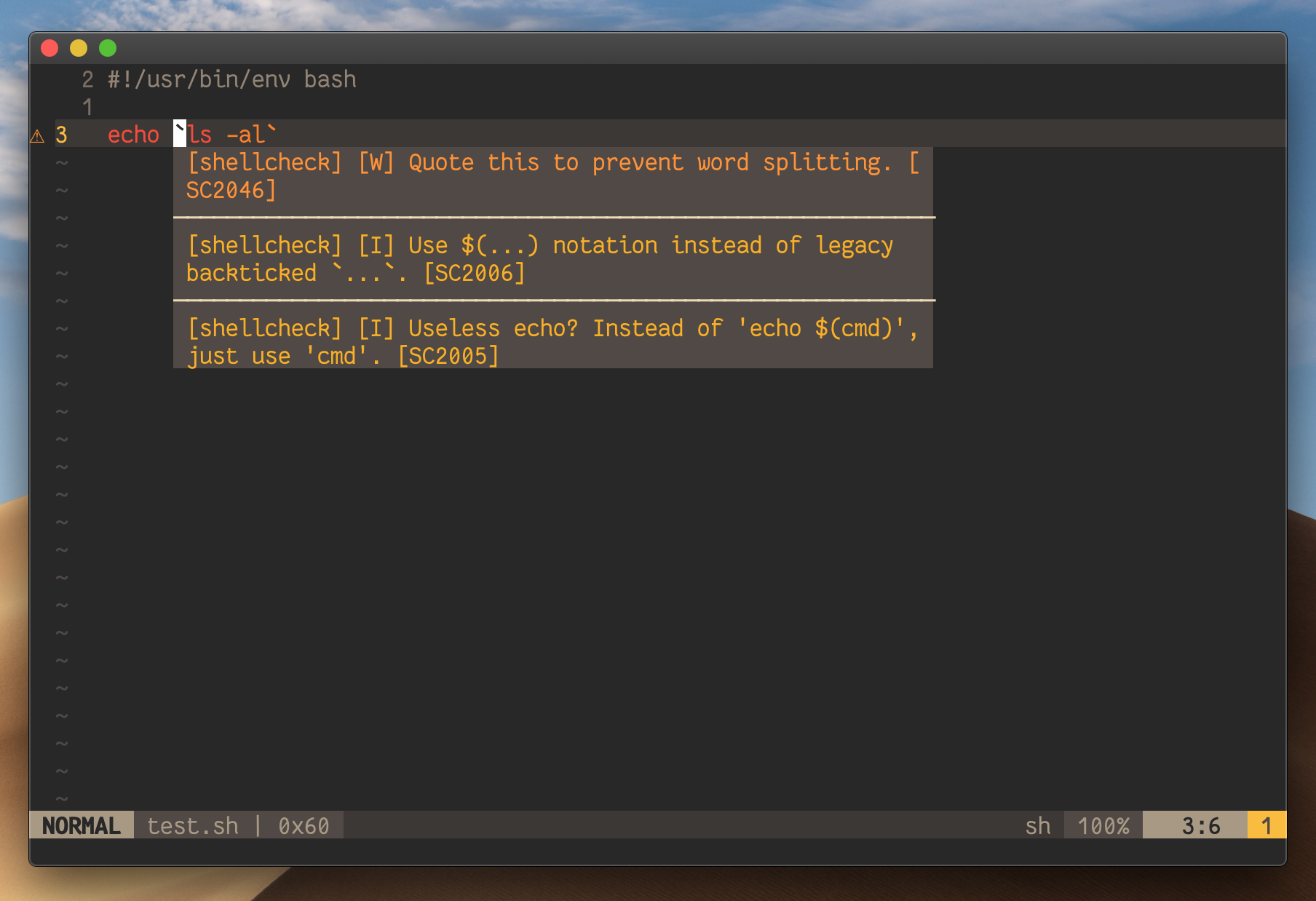General purpose Language Server that integrate with linter to support diagnostic features
- diagnostic with linters
- document format
screenshot with neovim and coc

yarn global add diagnostic-languageserverlanguageserver config:
{
"languageserver": {
"dls": {
"command": "diagnostic-languageserver",
"args": ["--stdio"],
"filetypes": [ "sh", "email" ], // filetypes that you want to enable this lsp
"initializationOptions": {
"linters": {
...
},
"filetypes": {
...
},
"formatters": {
...
},
"formatFiletypes": {
...
}
}
}
}
}linters field:
{
"linterName": { // linter name, for example: vint
"command": "shellcheck", // linter command
"rootPatterns": [], // root patterns, default empty array
"isStdout": true, // use stdout output, default true
"isStderr": false, // use stderr output, default false
"debounce": 100, // debounce time
"args": [ "--format=gcc", "-"], // args
"offsetLine": 0, // offsetline
"offsetColumn": 0, // offsetColumn
"sourceName": "shellcheck", // source name
"formatLines": 1, // how much lines for formatPattern[0] to match
"formatPattern": [
"^[^:]+:(\\d+):(\\d+):\\s+([^:]+):\\s+(.*)$", // line match pattern (javascript regex)
{
"line": 1, // diagnostic line use match group 1
"column": 2, // diagnostic column use match group 2
"message": [4], // message to display use match group 4
"security": 3 // security to use match group 3, ignore if linter do not support security
}
],
"securities": { // security keys, ignore if linter do not support security
"error": "error", // [key: string]?: "error" | "warning" | "info" | "hint"
"warning": "warning",
"note": "info"
}
}
}filetypes field:
{
"sh": "linterName", // filetype: linterName or linterName[]
}formatters field:
"dartfmt": { // formatter name
"command": "dartfmt", // format command
"args": [ "--fix" ], // args
"rootPatterns": [], // root patterns, default empty array
"isStdout": true, // use stdout output, default true
"isStderr": false, // use stderr output, default false
}formatFiletypes field:
{
"dart": "dartfmt", // filetype: formatterName or formatterName[]
}shellcheck for example:
file test.sh:
#!/usr/bin/env bash
echo `ls -al`then:
shellcheck --format=gcc test.shoutput:
t.sh:3:6: warning: Quote this to prevent word splitting. [SC2046]
t.sh:3:6: note: Useless echo? Instead of 'echo $(cmd)', just use 'cmd'. [SC2005]
t.sh:3:6: note: Use $(...) notation instead of legacy backticked `...`. [SC2006]
write pattern to match the line for line column message security:
const line = "t.sh:3:6: warning: Quote this to prevent word splitting. [SC2046]"
const formatPattern = "^[^:]+:(\\d+):(\\d+):\\s+([^:]+):\\s+(.*)$"
const match = line.match(new RegExp(formatPattern))
console.log(match)output:
{
0: "t.sh:3:6: warning: Quote this to prevent word splitting. [SC2046]"
1: "3"
2: "6"
3: "warning"
4: "Quote this to prevent word splitting. [SC2046]"
}so you got:
line:match[1]column:match[2]message:match[4]security:match[3]
and your formatPattern field will be:
"formatPattern": [
"^[^:]+:(\\d+):(\\d+):\\s+([^:]+):\\s+(.*)$", // line match pattern (javascript regex)
{
"line": 1, // diagnostic line use match group 1
"column": 2, // diagnostic column use match group 2
"message": [4], // message to display use match group 4
"security": 3 // security to use match group 3, ignore if linter do not support security
}
]Notes if the linter's message for per issue more then one line, you have to set the
formatLinesto fill your pattern, and you can view the languagetool pattern for example whichformatLines = 2
Example with coc.nvim
also if you use coc, you can use this extension https://github.com/iamcco/coc-diagnostic
- shellcheck for shell
- languagetool for grammer check
- more Linters config example.
coc-settings.json:
{
"languageserver": {
"dls": {
"command": "diagnostic-languageserver",
"args": ["--stdio"],
"filetypes": [ "sh", "email", "dart" ],
"initializationOptions": {
"linters": {
"shellcheck": {
"command": "shellcheck",
"debounce": 100,
"args": [ "--format=gcc", "-"],
"offsetLine": 0,
"offsetColumn": 0,
"sourceName": "shellcheck",
"formatLines": 1,
"formatPattern": [
"^[^:]+:(\\d+):(\\d+):\\s+([^:]+):\\s+(.*)$",
{
"line": 1,
"column": 2,
"message": 4,
"security": 3
}
],
"securities": {
"error": "error",
"warning": "warning",
"note": "info"
}
},
"languagetool": {
"command": "languagetool",
"debounce": 200,
"args": ["-"],
"offsetLine": 0,
"offsetColumn": 0,
"sourceName": "languagetool",
"formatLines": 2,
"formatPattern": [
"^\\d+?\\.\\)\\s+Line\\s+(\\d+),\\s+column\\s+(\\d+),\\s+([^\\n]+)\nMessage:\\s+(.*)$",
{
"line": 1,
"column": 2,
"message": [4, 3]
}
],
}
},
"formatters": {
"dartfmt": {
"command": "dartfmt",
"args": [ "--fix" ],
}
},
"filetypes": {
"sh": "shellcheck",
"email": "languagetool"
},
"formatFiletypes": {
"dart": "dartfmt"
}
}
}
}
}- local node_modules linter support like eslint or textlint
- diagnostic severity
- root pattern
- document format
- inspired by efm-langserver

